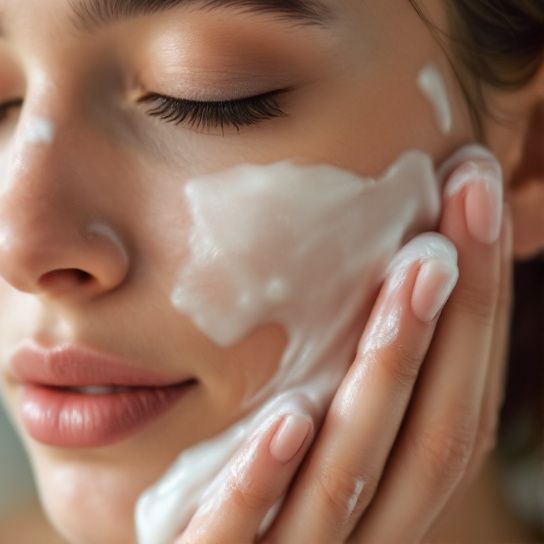Have you ever stepped outside on a humid day and felt like you were wrapped in a wet blanket? Now, imagine what that soupy air does to your skin, especially if you’re struggling with acne. Let’s get into the nitty-gritty about “acne humidity” and what you can do to thrive in those muggy conditions.
Humidity can be a friend or foe. On one hand, it gives skin a dewy look. On the other, it can lead to breakouts and exacerbate acne if not managed correctly. The good news is, working within the challenges of a humid climate doesn’t have to be a losing battle. With some savvy strategies, you can achieve serene, balanced skin. So, let’s dive into how to keep your skin glowing even when the humidity isn’t on your side.
Understanding the Impact of Humidity on Skin
First things first, what exactly does humidity do to the skin? Those high humidity levels might sound like they’d keep skin hydrated by default, but it’s a bit more complex than that. Moisture in the air can make your skin produce more oil, which can trap sweat and dirt, leading to clogged pores and, you guessed it, acne.
This might seem counterintuitive, but the key here is **balance**. Your skin naturally strives to find it, juggling between being too oily and too dry, especially in changing environmental conditions. Excessive oil doesn’t get along with humidity, frustratingly enough!
The Science of Breakouts in Humidity
Why the big fuss about acne in high moisture environments? When your skin’s oil glands, or sebaceous glands, detect dryness, they kick into overdrive to compensate. Oddly, in a humid environment, the skin can misinterpret the slick layer forming on it as a sign to stop oil production. The outcome? Sebum can mix with external pollutants and dead skin, which is often bundled into a cocktail of “hermit-breakers” for acne across humidity-pumping seasons.
Steps to Manage Acne in Humidity

- Cleanse Your Skin Regularly
- Ideally, choose a gentle cleanser that removes excess oil and impurities without stripping your skin. Foaming cleansers with salicylic acid can help clear clogged pores but cycled with gentler scrub-free options can prevent irritation.
- Exfoliate, But Don’t Overdo It
- Aim for twice a week. Too much exfoliation can signal your skin to produce even more oil. Go for chemical exfoliants like AHAs or BHAs. They penetrate pores effectively, removing the filth humidity leaves behind.
- Moisturizer – Yes, It’s Still Necessary
- Hear me out. Use a lightweight moisturizer or gel-based product. It hydrates without adding to the oil overload. Look for non-comedogenic products that include humectants like glycerin or hyaluronic acid that trap moisture without the greasiness.
- Sun Protection is Non-Negotiable
- UV rays don’t take a day off. Neither should your sunscreen. Opt for a non-oily, broad-spectrum SPF. Mineral-based options often provide a mattifying effect suited for shiny endeavors on humid days.
- 5. **Avoid Heavy Makeup Products
- Swapping for mineral makeup avoids clogging while maintaining breathability. Heavy products can lock in sweat, bacteria, and oil – a surefire concoction for acne.
Moisture Control Tactics
Now, moisture control in humid conditions helps you achieve the aforementioned balance. Counter the perspiration of sticky climates with some smart skin care decisions.
Physical Barriers Minimize Sweat Trapping
Think moisture-wicking skin coverings. Products with breathable interfaces ease sweat evaporation. If you wear makeup regularly, this buffer can forge a protective seal without suffocating pores.
Use Air Conditioning Wisely

It’s about balance again. Too much artificial drying can meddle with this ecosystem. Instead, regulate use to decrease humidity while retaining some ambient moisture necessary for a hydrated glow.
Key Ingredients to Seek Out
- Salicylic Acid: Excellent for combating acne bacteria.
- Hyaluronic Acid: Ultra-hydrating without a lightweight feel.
- Tea Tree Oil: On spots, acts against acne without drying the surrounding skin.
- Niacinamide: Reduces inflammation and helps fight against acne.
Addressing Internal Factors
Let’s keep it real—staying hydrated and maintaining a balanced diet contribute starkly to both how you handle humidity and its resulting skin showdowns.
Water, Food, and Rest: Triad of Influence
- Hydrate Internally: Adequate drinking water lessen heavy oil metabolism, cutting down the probability of acne.
- Eat Wisely: Sweep in anti-inflammatory foods that are friendlier to your body during humid growth patches. Omega-3 fatty acids, zinc, green vegetables, and fruits balance out what ails the skin.
- Sleep This Into Control: Poor sleep wreaks havoc on your skin when accentuated by humid parking lots. Prioritize an eight-hour routine to assist in the natural skin repair.
Mistakes to Avoid in a Humid Climate
Overusing Oil-blotting Sheets

Over-reliance on these little sheets might give facades of quick fixes but over time incites more production of sebum, acting out in your already greasy atmosphere.
Applying Thick Layers of Products
Layer carefully. Humid air equals reduced build-up. Trust me here, cut back to essentials—cleanser, moisturizer, and sunblock suffice when complemented by clean eating and optimal hydration.
Forgetting Your Immediate Environment
Maintaining skin during summer hikes or humidity-bound destinations means staying mindful of allergens or different water types—sacrificing either for cleared-up space.
Bringing It All Together
You’re not alone facing the wrath of humidity with your skin’s moisture fate on the balance front line. With understanding surfaces oily predicaments where many might shy away, feeling armed emerges crucial against acne marks and miner stress relievers.
Embracing smart moves inside and out—sweetened allure of reliable skin harmony supersedes humid unpredictability. Flip through your record for reassurance or prod one more pocket of tips. Envision the translucent canvas from carefully selecting ingredients and an intuitive skin routine. Celebrate dewy cheeks as they shift from despair to balance.
Let’s close this humid talk with a rekindled perspective. The foe, if galvanizing a storm, also presents steadier settings adaptable to even tissues convicted otherwise. Face with composure, leveraging both visible secrets and contextual confidences wiping the signature truffle—and thus removing from the bottom pile discerning a humid version of a derma win.
Frequently Asked Questions
Does High Humidity Directly Cause Acne?
High humidity does not directly cause acne, but it can create conditions that are more conducive to breakouts. Increased moisture in the air can lead to more sweat and oil production, which can clog pores and result in acne[1][3][5).
How Does Humidity Affect Different Skin Types in Relation to Acne?
Humidity affects different skin types differently. For oily skin, high humidity can increase oil production, leading to clogged pores and more frequent acne breakouts. For dry skin, high humidity can hydrate the skin, but excessive moisture can still disrupt the skin’s natural balance. Combination skin may experience a mix of these effects[1][4][5).
What Skincare Adjustments Should Be Made in High Humidity to Manage Acne?
In high humidity, it is recommended to use lightweight, non-comedogenic skincare products, cleanse your skin more frequently, and opt for gel-based moisturizers to manage increased oil and sweat production. Products containing salicylic acid, Mandelic Acid, Alpha Lipoic Acid, and niacinamide can help control oil production and fight acne-causing bacteria[1][3][5).
Can Low Humidity Also Affect Acne, and If So, How?
Yes, low humidity can affect your skin by causing it to dry out. This dryness can prompt the skin to produce more oil to compensate, potentially leading to clogged pores and acne. This compensatory mechanism can exacerbate acne issues, especially for those with oily or combination skin[1][3][5).
References- Exposed Skincare. (2023). Does Humidity Cause Acne?.
- Vasseur Skincare. (n.d.). Battle the Breakouts Humidity and Acne.
- Schlessinger MD. (2024). Managing acne in humid weather.











